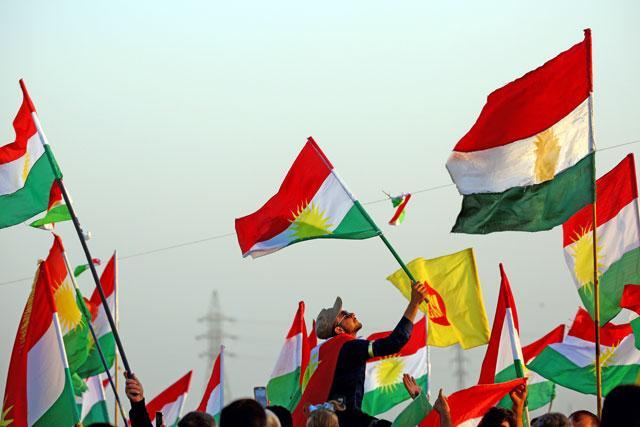
Iraqi Kurds face growing isolation after referendum
Official results showed 92.73 per cent of voters backed statehood in Monday's non-binding referendum, which Iraq's central government has rejected as illegal.
Repercussions were swift, with airlines from Turkey as well as Jordan, Egypt and Lebanon saying they would halt flights to Iraqi Kurdistan this week until further notice at the request of Baghdad.Attempts to isolate the Kurds came not just from Baghdad but also from Ankara, which has threatened a range of measures including cutting exports to the region.
While Iraqi Kurd leader Massud Barzani said the vote would not lead to an immediate declaration of independence but should instead open the door to negotiations, Iraqi Prime Minister Haider Al Abadi rejected the approach.'The referendum must be annulled and dialogue initiated in the framework of the constitution. We will never hold talks based on the results of the referendum,' Abadi told lawmakers on Wednesday.
'We will impose Iraqi law in the entire region of Kurdistan under the constitution,' he said.An overwhelming 'yes' vote had been widely expected from the electorate of 4.58 million. Turnout was more than 72 per cent.
Pursuing a long-cherished dream of statehood, the Kurds went ahead with the referendum in defiance of widespread objections, including from the United Nations and United States.It has raised fears of unrest and the possibility of a military confrontation involving the Kurds, who are key allies in internationally backed offensives against the Daesh terror group militants.
In a televised address late on Tuesday, Barzani had urged Abadi 'not to close the door to dialogue because it is dialogue that will solve problems'.'We assure the international community of our willingness to engage in dialogue with Baghdad,' he said, insisting the referendum was not meant 'to delimit the border [between Kurdistan and Iraq], nor to impose it de facto.'
Airlines cancel flights
Baghdad has steadily pushed back against the vote.
Lawmakers on Wednesday passed a resolution calling on Abadi to 'take all necessary measures to maintain Iraq's unity' including by deploying security forces to disputed areas.The resolution also called for the closure of border posts with Turkey and Iran that are outside central government control.
Abadi said Tuesday he would ban all international flights to and from Kurdistan in three days unless airports in its main cities Erbil and Sulaimaniyah were placed under his government's control.Turkish Airlines and fellow Turkish carriers Atlas and Pegasus, which offer frequent connections to Iraqi Kurdistan, would halt their flights from Friday, the Turkish consulate in Erbil said.
Lebanon's Middle East Airlines said it would also stop flights to and from Erbil from Friday, when EgyptAir said it would also begin an indefinite suspension.Iran, which also has a large Kurdish minority, stopped all flights from its territory to and from Iraqi Kurdistan on Sunday while also condemning the vote.
Turkey fears the vote will stoke the separatist ambitions of its own sizeable Kurdish minority and on Tuesday President Recep Tayyip Erdogan warned that Iraq's Kurds risked sparking an 'ethnic war'.'If Barzani and the Kurdistan Regional Government do not go back on this mistake as soon as possible, they will go down in history with the shame of having dragged the region into an ethnic and sectarian war,' he said.
Erdogan had earlier warned that Turkey would shut its border with Iraqi Kurdistan and threatened to block oil exports from the region through his country.Erdogan even suggested the possibility of a cross-border incursion similar to the one Turkey carried out against Daesh and Kurdish fighters in Syria.
Monday's vote took place across the three northern provinces of autonomous Iraqi Kurdistan — Erbil, Sulaimaniyah and Dohuk — and in disputed border zones such as the oil-rich province of Kirkuk.Analysts say that despite their threats, Baghdad, Ankara and Tehran are wary of sparking a serious confrontation with the Kurds.
Closing their borders would also hurt Turkey, whose exports to the region are worth more than $8 billion a year, and Iran, which exports about $6 billion.

Legal Disclaimer:
MENAFN provides the
information “as is” without warranty of any kind. We do not accept
any responsibility or liability for the accuracy, content, images,
videos, licenses, completeness, legality, or reliability of the information
contained in this article. If you have any complaints or copyright
issues related to this article, kindly contact the provider above.


















Comments
No comment